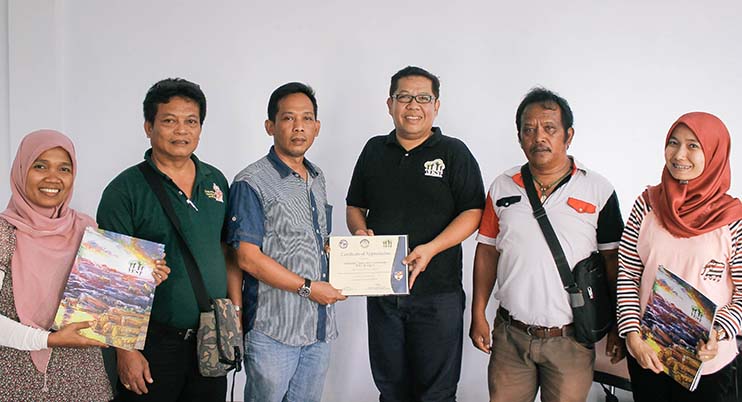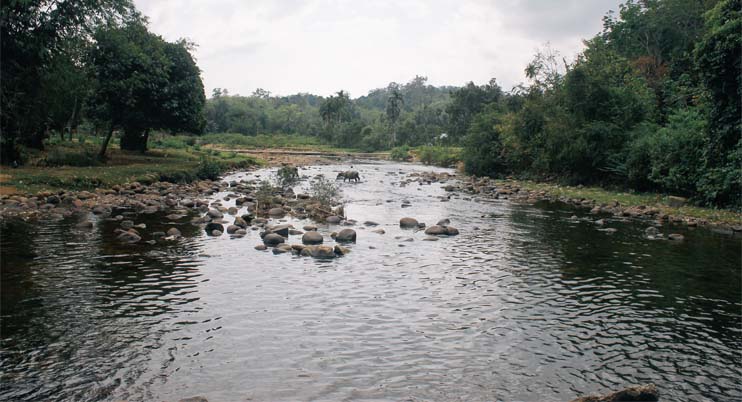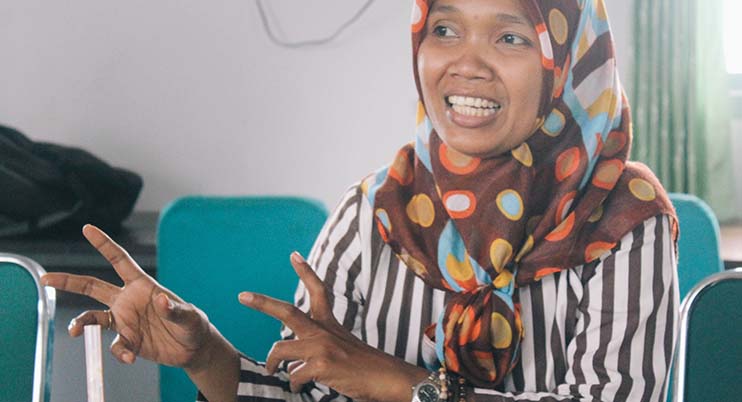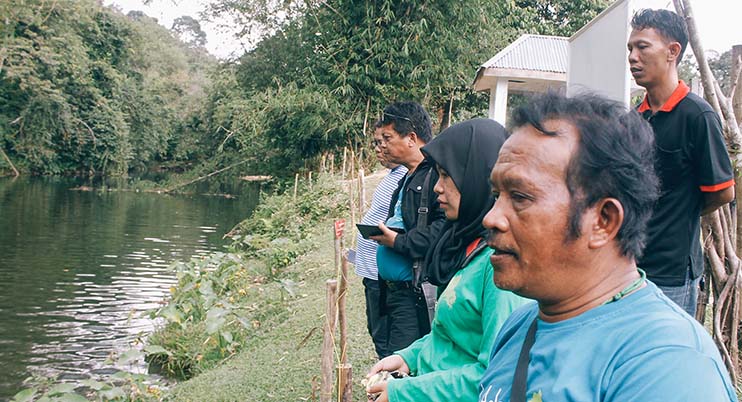
[Members of the Valuing Ecosystem Services Together (VEST) team of Xavier University and Indonesian Conservation Community - WARSI strike a pose after presenting each other's challenges, outcomes and opportunities on Payment for Ecosystem Services (PES) as a sustainable strategy for achieving shared responsibility and ecological balance in the two countries.]
By Stephen J Pedroza
Aside from being tropical and archipelagic countries, both the Philippines and Indonesia possess diverse ecological resources that need multisectoral and sustainable management.
It is with this pursuit that the Valuing Ecosystem Services Together (VEST) team of Xavier University embarked on a knowledge-sharing trip with the Indonesian Conservation Community - WARSI earlier this month to share its challenges and milestones in sustaining green growth through an emerging market-based conservation mechanism and the use of a social marketing campaign.
Both in Indonesia and the Philippines, ecosystem services play an increasingly significant role in national discourse, as witnessed by the growing number of collaborative programs involving various stakeholders from the government, civil society organizations, and national and international research and development agencies.

[The VEST and WARSI teams together with the local leaders visit a protected river in Senamat Ulu where the villagers are only allowed to fish once every year, during a festival according to their calendar.]
Sharing of conservation efforts
“Due to climate change, there is all the more need to conserve and sustain our ecosystem services that help develop livelihoods, medicine and protection for the community against disasters,” said Emmy Primadona, project coordinator of WARSI’s Reducing Emissions from Deforestation and Forest Degradation (REDD+).
“Besides sharing our experiences, this learning visit enabled us to learn from the social marketing experience of VEST in environmental protection in the Philippines and how to address the challenges, especially in encouraging different sectors to pay for ecosystem services,” she added.
Established in 1991, WARSI is one of the local NGOs carrying out pilot “Payment for Ecosystem Services” (PES) schemes as early as 2004, focusing on “rewarding” rubber tappers for the ecosystem services provided by the agroforests in the Bungo district of the Batang Hari river catchment in Jambi, Indonesia.
On the other hand, the PES project in Northern Mindanao, built on research and community collaborations, has introduced to Region 10 a “rewarding mechanism” where there exists “the seller” who protects and provides ecosystem services to “the buyer” who benefits from these intangible products.
“The project implementers encouraged different sectors to ‘inVEST’ in a ridge-to-reef approach to forest restoration and at the same time fulfill the community development plan (CDP) of our partner indigenous group,” said Evans Yonson, social marketing supervisor of VEST.
Officially launched in November 2014, VEST is the offshoot campaign of PES aimed at promoting the importance of working together for a paradigm shift to the “new normal” and encouraging different sectors to invest in the cause of the project.
Since its inaugural year, VEST has built a network of student volunteers, conducted school orientations, produced two music albums on conservation, organized speaking engagements and film festivals about the PES project, and collaborated with different organizations for local and global environmental celebrations.
The VEST team considers the positive reception of the project as a “good start,” an indicator that different groups in Region 10 are becoming “environment-friendly and willing to dole out money for Mother Nature.”
“We have seen from the presentation that VEST as a social marketing campaign for Payment for Ecosystem Services in the Philippines has been effective especially in engaging the business sector and the youth. We are very impressed with the creative ways carried out by VEST,” Primadona commended.

[Emmy Primadona, project coordinator of WARSI’s Reducing Emissions from Deforestation and Forest Degradation (REDD+)]
Why “pay” for ecosystem services?
The Miarayon–Lapok–Lirongan–Tinaytayan Tribal Association (MILALITTRA) serves as the seller in this PES project for the Cagayan de Oro river basin while the different sectors in the region are the buyers of the various ecosystem services.
Based on the report of Xavier Science Foundation (XSF), the project’s fund manager, the PES project has accumulated Php1.3M as “investment” from business establishments, cooperatives, academic institutions, religious organizations and households in Cagayan de Oro City over the past year.
“It has also been a big challenge for the project implementers to sell something that is not concrete, to sell ecosystem services. But through a series of promotional activities and meetings, we were able to first sell the idea for PES,” Yonson mused. “Then, investing money came in next.”
Just like the experience of XSF and VEST, WARSI has encountered difficulty in encouraging people to pay for ecosystem services which are “already there.”
“It is hard to make people understand the concept of PES because it involves money. Why pay for ecosystem services? That is why we need to come up with steps on how to integrate the PES concept into community projects,” Primadona shared.
WARSI’s programs are geared toward addressing deforestation, mitigating the effects of climate change and empowering the community while incorporating PES in the process (eg Adopt-a-Forest Project, community savings etc).
“We want to reduce deforestation, build the capacities of the locals and listen to what the real problems in the community are,” she added. “We are promoting planting local, native trees in their village forests, particularly for the villages along the Batang Hari, the longest river in Sumatra.”

[The VEST and WARSI teams together with the local leaders visit a protected river in Senamat Ulu where the villagers are only allowed to fish once every year, during a festival according to their calendar.]
Lessons learned
WARSI also works with indigenous tribes just like the PES project in Northern Mindanao to ensure that the streamlines along the region develop high water infiltration capacity and provide continuous supply of potable water, clean air and food, among others.
“We can see that both PES projects have IP partners. We have a special connection with the forest that is part of our identity as a tribe,” said MILALITTRA leader Datu Dungkoan “Rio” Besto who shared his experiences in dealing with the different sectors for this green endeavor to flourish.
“Our communities have become empowered and strengthened. We stand united to enhance our connection with the protected forests and in building a closer community.”
The active involvement of indigenous groups in PES projects has been inspiring examples of what cooperation begets.
The accumulated funds from PES in Northern Mindanao will be used to realize the five-year development master plan of MILALITTRA in the areas of environmental protection, cultural preservation, youth development, and education and health services, among others. For the environmental aspect, their CDP targets to reforest 832 hectares and utilize 816 hectares for agroforestry.
“There must be a strong commitment and involvement of the local community in forest protection and conservation efforts through local based approach,” Datu Rio reflected.
The MILALITTRA is also looking forward to building their tulugan (a sacred place for community dialogues and rituals) and to providing incentives to the Bantay Lasang volunteers using the income and support generated from PES.
The team visited the village of Senamat Ulu in Bungo to meet the locals and learn from their initiatives. WARSI and the local leaders brought the VEST team to a protected river in Senamat Ulu where the villagers are only allowed to fish once every year, during a festival according to their calendar.
Vergilino P Alima, officer-in-charge of Community Environment and Natural Resources Office (CENRO) – Malaybalay, commended how the community and WARSI for making use of localized print, broadcast and multimedia materials to inform and educate the indigenous group and villagers about conserving their natural resources. CENRO is one of the partner government agencies of PES-NorMin.
“There is an active involvement of the local community and local government in revenue generation by putting up micro-hydro power plant as part of their PES scheme besides allocating a certain amount from their community savings for environmental projects,” Alima said.
Women empowerment
The VEST team also got the opportunity to visit a Lubuk Beringin village in Jambi where its women have used the name Dahlia for a micro credit institution they manage collectively to support their daily expenses and conserve their forests at the same time.
Like a flower, the Dahlia Independent Community Organization (DICO) has bloomed from its humble beginnings. The cooperative was established when WARSI was conducting a community program with the locals from Lubuk Beringin.
WARSI facilitated the village women to meet every Friday after worship. The group then worked on “money sharing lottery system” and constantly improving it while getting more members in the process.
Dahlia now holds an annual meeting where some of its profits are distributed among members so they can venture into new micro-enterprises while another portion of the income will be allotted for the village’s operational costs for conservation work.
Lubuk Beringin villagers' main source of livelihood comes from rubber trees which grow well in the extensive forests surrounding the area. The mini hydro power plant they were able to build in a river nearby also provides electricity to over 200 households in their village.
The journey of Dahlia has been chronicled in a book titled “Namaku Dahlia” by Syfrizaldi and it has inspired other women’s groups to put up their own cooperative without leaving the environment behind.
***
For the Philippines where PES mechanisms are just starting to gain attention, this learning visit has been an avenue for understanding ecological issues in Indonesia, comparing them to the environmental issues of our country, and understanding how different communities protect their environment and improve the quality of life of the forest managers.
Learning from each other’s experiences, WARSI and VEST have forged a partnership in the Southeast Asian region through the Ecosystem Alliance on how to develop PES as a long-term strategy for achieving shared responsibility and ecological balance amid the diversity of cultures, religions and initiatives.